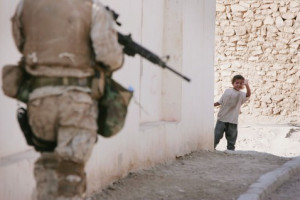In February 2013, President Barack Obama once again assured Americans and the international community that combat operations in Afghanistan would cease in 2014. He was talking about the allied NATO forces in that country, which include a large number of American troops.
Based on our unfortunate stay in Afghanistan, sober-minded analysts, both American and Russian, doubt that the Afghan military and internal security forces will be able to maintain stability in that long-suffering country. According to a Pentagon assessment released in December 2012, only one of the 23 Afghan army brigades is capable of functioning independently. As we know, illiteracy is high in both the country and the army, and many deserters from the army join the rebels who are opposing the Kabul government. There have been many instances of Afghan units attacking their American “comrades in arms.” The reasons for that vary and include computational errors resulting from Afghan soldiers’ lack of professionalism.
US military leaders are putting a “good face on a bad game.” Thus, contrary to all the facts, former US Secretary of defense Leon Panetta has praised the progress supposedly made by the Afghans towards building their army, which he says is becoming increasingly independent. He said the Afghan military carries out about 90% of military operations throughout the country. “We are on the right track in Afghanistan. And we will be able to transition over these next two years to a point where the Afghans themselves can govern and secure themselves.,” he said in early 2013.
Afghan President Hamid Karzai echoed the Americans when he assured them that Afghans welcomed the withdrawal of American forces from the country and are confident in the ability of their military to protect the populace against Taliban militants.
The expert Russian community and more farsighted Western analysts are convinced that the withdrawal of most Western military units alone cannot stabilize the country to an acceptable degree.
These analysts, both in the United States and in other countries, agree that the situation in Afghanistan can only be normalized by developing the country’s economy. And that is simply not happening.
We can draw a parallel with the withdrawal of Soviet troops from Afghanistan. At the time, our country was trying to initiate a variety of economic projects that would establish a balance between the central government and the various warring factions within Afghanistan. The stability was shaken, however, and the country plunged back into civil war almost immediately after the Soviet Union’s lamentable collapse.
Will the West, and especially the United States, consider the bitter experience of our country, which has gone through a similar period? Have the Afghans learned the bitter lesson of history, or could they again fall into the same trap?
We might conclude from the current situation that no one has yet learned a thing, and few understand what will happen to Afghanistan after 2014.
Russian officials believe the Americans and their allies are now taking some extra steps to improve Afghanistan’s economy, beginning with some major industrial and agricultural projects. And in the year and a half remaining, these facilities may only begin to somehow support social peace in this war-torn society.
Russia is aware that it will not be easy for the Western world to invest significant resources in a country located tens of thousands of kilometers from Europe and the United States. The economic crisis has gone global and each individual country needs to deal with it, and the leaders of those countries will find it difficult to justify the extremely high costs both of maintaining their troops in Afghanistan (for many years now) and of projects to save the country from a final collapse. After all, the Afghan Aid Fund was established, and the developed countries, primarily Japan, poured more than $10 billion into it.
I recall very well the position of many Afghans because I have studied the region for a long time and worked in Russian diplomatic missions there. Many of them agreed to accept foreign economic assistance but believed that they should be the ones to allocate it within the country without the involvement of its donors.
V. A. Maleyev is an expert Orientalist. This article was written expressly for New Eastern Outlook.
